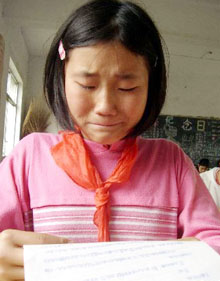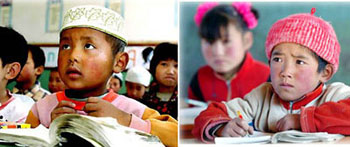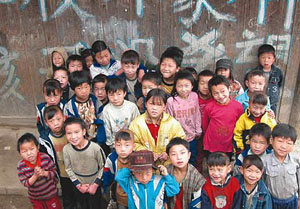| Tools: Save | Print | E-mail | Most Read |
| Remembering Children 'Orphaned' by Development |
| Adjust font size: |
With tears in her eyes and her fingers shaking, a nine-year-old girl's voice trembled as she read a letter she had written to her parents out loud for her classmates. Like millions of rural folk, the girl's parents left their rural home to work in the city. Migrant workers as they're called, predominantly from poor rural areas of China, form the backbone of the labor force that drives China's rapidly developing economy. Hordes of surplus labor from the countryside make their way every day into the cities in search of work and a better life for their families back home. However, child welfare experts point out that while their parents might be making huge contributions to the economy and ensuring some material comfort for their families they leave behind in the villages, that development has come at a huge price; their children, known as "liu shou er tong" in Chinese, or literally "left behind children". According to statistics from the National Bureau of Statistics, there are about 10 million "left behind children" under the age of 15. On May 27, Gu Xiulian, vice chairwoman of the Standing Committee of China's National People's Congress and president of the All-China Women's Federation, accompanied by leaders from 17 related ministries and departments, toured a special school for migrant workers in Beijing's Daxing District. The school, and others like it in various parts of China, was set up with the aim of teaching migrant workers with children the basics of parenting. Gu stressed that it is important and significant to resolve the problems of "left behind children" and urged society to work together to develop a new system of supervision to safeguard their rights and the rights of children in general. Reportedly, some 1,000 special schools are to be built around China this year. Problems the children face
In August 2005, the Provincial Committee of the Communist Youth League (CYL) in Hunan, conducted a survey to identify the problems that plague "left behind children". The survey covered 16 towns and counties in eight cities. Distributing questionnaires to guardians, teachers and "left behind children", the survey posed questions relating to a variety of topics including mental health, behavioral development, family environment, education, and peer relationships. According to the survey results, many children feel that "study is useless". Only 33.6 percent said that their dream was to study. Some 57.1 percent of them want to follow in their parents' footsteps and become migrant workers in the cities or start small businesses after they graduate from middle school. A third of the children were found to be lacking in self-confidence. Only 35.1 percent showed any signs of a willingness to study and succeed in their studies. Moreover, the majority of teachers and guardians were not satisfied with the children's performance at school. A high proportion of the children, about 63.9 percent, complained that there was no one to guide or teach them. Survey researchers also found that teachers often do not pay these children enough attention and many guardians lack the education level and ability to teach the children at home.
The Hunan CYL conducted another investigation into the mental health of "left behind children". They studied a total of 285 boys and 381 girls. Results show that 57 percent of the children have psychological problems, 9.3 percent of which are considered serious. Some of the problems include depression and short attention spans. Unable to cope with their situations and yearning desperately for parental attention, many children run away from home either ostensibly to look for their parents or to find work in the cities as well. Given the generally dire living conditions in China's rural areas, a situation that forces rural folk to find work in faraway cities, experts acknowledge that it is difficult for migrant workers with children to balance their parental obligations between providing materially as well as emotionally.
(China.org.cn by Wang Ke May 31, 2006) |
| Tools: Save | Print | E-mail | Most Read |
 |
| Related Stories |
| Product Directory China Search |
Country Search Hot Buys |



